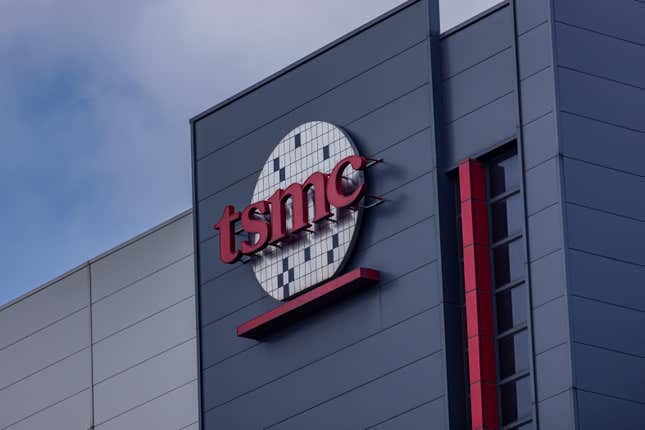
The world’s largest semiconductor foundry stopped some chipmaking and evacuated staff after a 7.4 magnitude earthquake hit Taiwan — its largest earthquake in 25 years.
Taiwan Semiconductor Manufacturing Co., which is the main contractor to chip industry leader Nvidia and iPhone-maker Apple, evacuated employees from some fabrication plants as it assessed the earthquake’s impact, it said in a statement shared with Quartz. “All personnel are safe and returned to their workplace shortly after the incident,” TSMC said, adding that it “is currently evaluating the impact.”
Initial inspections of its sites show they “are normal,” the company said, but work was suspended at construction sites Wednesday. The company said it expects operations at impacted facilities to continue overnight. So far, nine people have been reported dead and 50 people have been reported missing due to the earthquake.
“Based on TSMC’s ample experience and capabilities in earthquake response and damage prevention, as well as regular disaster drills to ensure full readiness, overall tool recovery of our [fabrication plants] reached more than 70% within 10 hours of the earthquake, with new [fabrication plants] such as the Fab 18 facility reaching more than 80%,” TSMC said.
Some small tools were damaged, “partially impacting their operations,” but critical tools, including all of its extreme ultraviolet lithography tools, were not damaged, the company said.
Another Taiwanese chipmaker, United Microelectronics Corp. (UMC), said in a statement the earthquake “had no material impact on UMC’s operations,” and that its staff was safe at its facilities. However, it said automatic safety measures were carried out at facilities in Hsinchu and Tainan. “Currently, operations and wafer shipment are resuming as normal, and there will be no meaningful impact on UMC’s finances and business,” it said.
TSMC makes an estimated 90% of the world’s advanced chips. Stopping chip production will disrupt the global semiconductor supply chain, Barclays analysts wrote in a note, according to Bloomberg. Analysts noted that advanced semiconductors can require weeks in a vacuum.
“Some of the high-end chips need 24/7 seamless operations in a vacuum state for a few weeks,” Bum Ki Son and Brian Tan wrote. “Operation halts in Taiwan’s northern industrial areas could mean some high-end chips in production may be spoiled.”